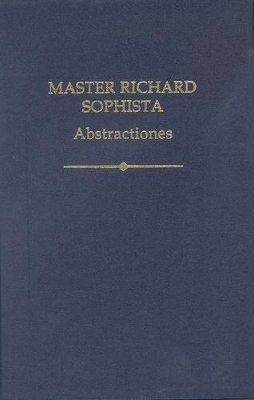
Master Richard Sophista: Abstractiones
Oxford University Press (Verlag)
978-0-19-726597-0 (ISBN)
The Abstractiones is a work in medieval logic from the second half of the 13th century. Clearly a product of the British university culture and much cited, quoted and imitated, it is attributed in two manuscripts to 'Master Richard the Sophist'. This Richard is referred to by other philosophers and logicians as 'The Master of Abstractions' - an honorific title which indicates that his work was a standard textbook.
The Abstractiones is a collection of sophismata, or logical puzzles of increasing complexity and difficulty which have been gathered under logical operators like 'all'. Each sophisma is introduced by a proposition that appears to be both provably true and provably false, like 'God knows whatever he knew'. The Master determines the truth or falsity of the proposition and analyses the defects of the arguments that have been offered by detecting logical fallacies, equivocal expressions and the like. The work as we have it is clearly the result of a process of development, modification, and interpolation, probably extending over at least a generation. Although there came to be works that imitated the Abstractions and followed some of its plan and style, these are 'descendants,' rather than variations.
The Abstractions gives us a better sense than does an independent and original work of medieval logic like William of Ockham's Summa Totius Logicae of how instruction in techniques of argumentation and reasoning, often of a fairly sophisticated sort, was carried on in British universities in the latter part of the 13th century and well into the 14th century.
Professor Sten Ebbesen Studied classical philology, Russian and Modern Greek in Copenhagen 1964-72, but in 1966-67 at the University of Thessaloniki. BA in Modern Greek 1968, MA in classical philology 1972. Dr. phil. Copenhagen 1981. Honorary doctor University of Gothenburg 2013. Employed as a classicist in Copenhagen since 1972. Main research field: late ancient and medieval logic and semantics. Some 270 scholarly publications, including numerous first editions of Greek and, mainly, Latin texts. Since 1982 editor of Cahiers de l'Institut du Moyen-Âge Grec et Latin. Editor-in-chief of Corpus Philosophorum Danicorum Medii Aev 1982-, and of Johannes Buridanus, Summulae 1994-. Professor Mary Sirridge is Professor of Philosophy at the Louisiana State University. She received her Ph.D. at The Ohio State University in 1972. Her specializations are aesthetics, ancient and medieval philosophy, and medieval logic and grammar. Professor E. Jennifer Ashworth read history at Girton College, Cambridge and then received a PhD in philosophy from Bryn Mawr College in the United States. My entire teaching career was spent in Canada, first at the University of Manitoba from 1964 to 1969, and then at the University of Waterloo in Ontario from 1969 to 2005. I specialize in late medieval and Renaissance logic and semantics.
INTRODUCTION; TEXT
| Erscheinungsdatum | 25.05.2016 |
|---|---|
| Reihe/Serie | Auctores Britannici Medii Aevi ; 25 |
| Verlagsort | Oxford |
| Sprache | englisch |
| Maße | 164 x 239 mm |
| Gewicht | 746 g |
| Themenwelt | Geisteswissenschaften ► Philosophie ► Logik |
| Geisteswissenschaften ► Philosophie ► Philosophie des Mittelalters | |
| ISBN-10 | 0-19-726597-9 / 0197265979 |
| ISBN-13 | 978-0-19-726597-0 / 9780197265970 |
| Zustand | Neuware |
| Haben Sie eine Frage zum Produkt? |
aus dem Bereich


